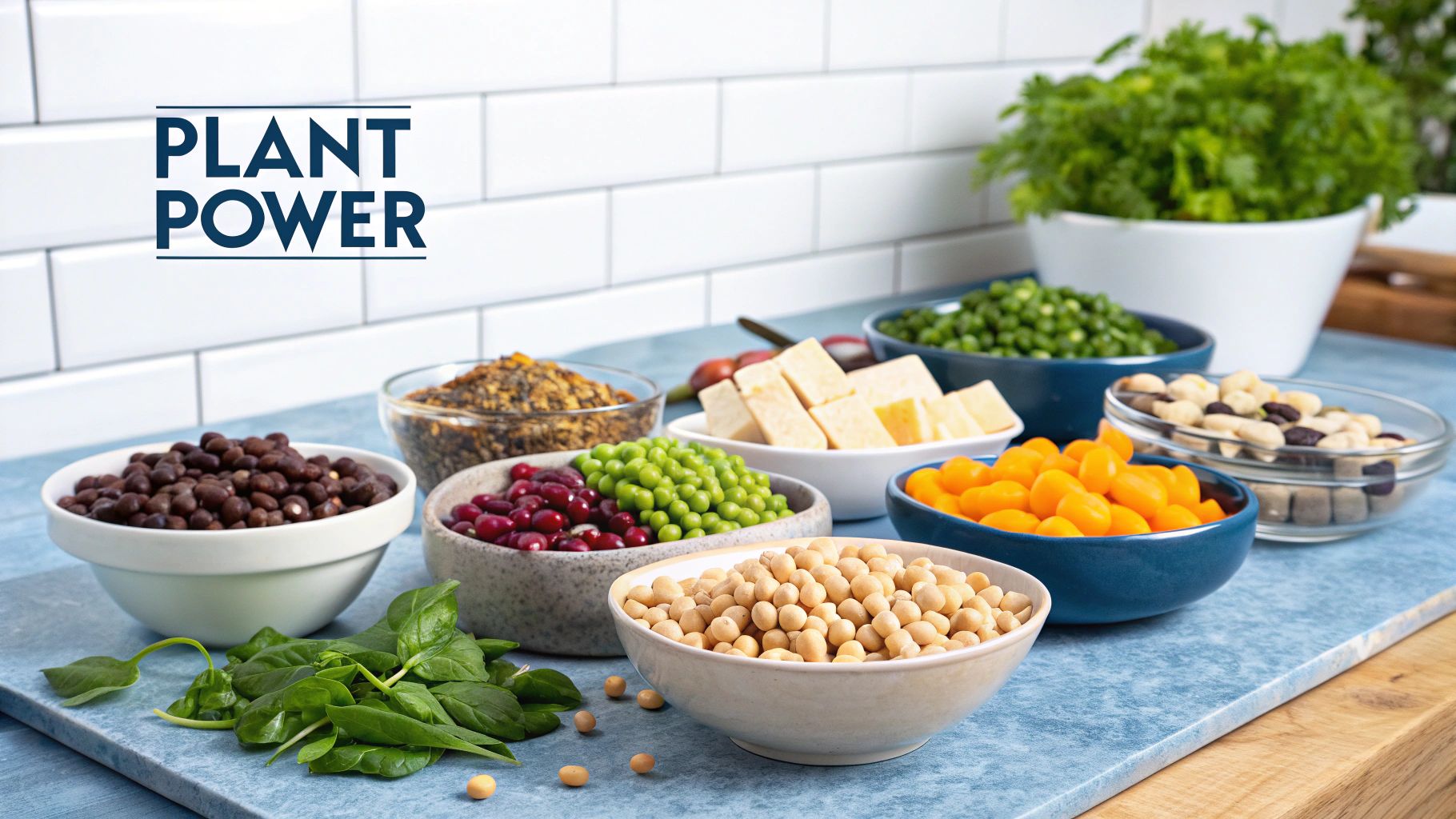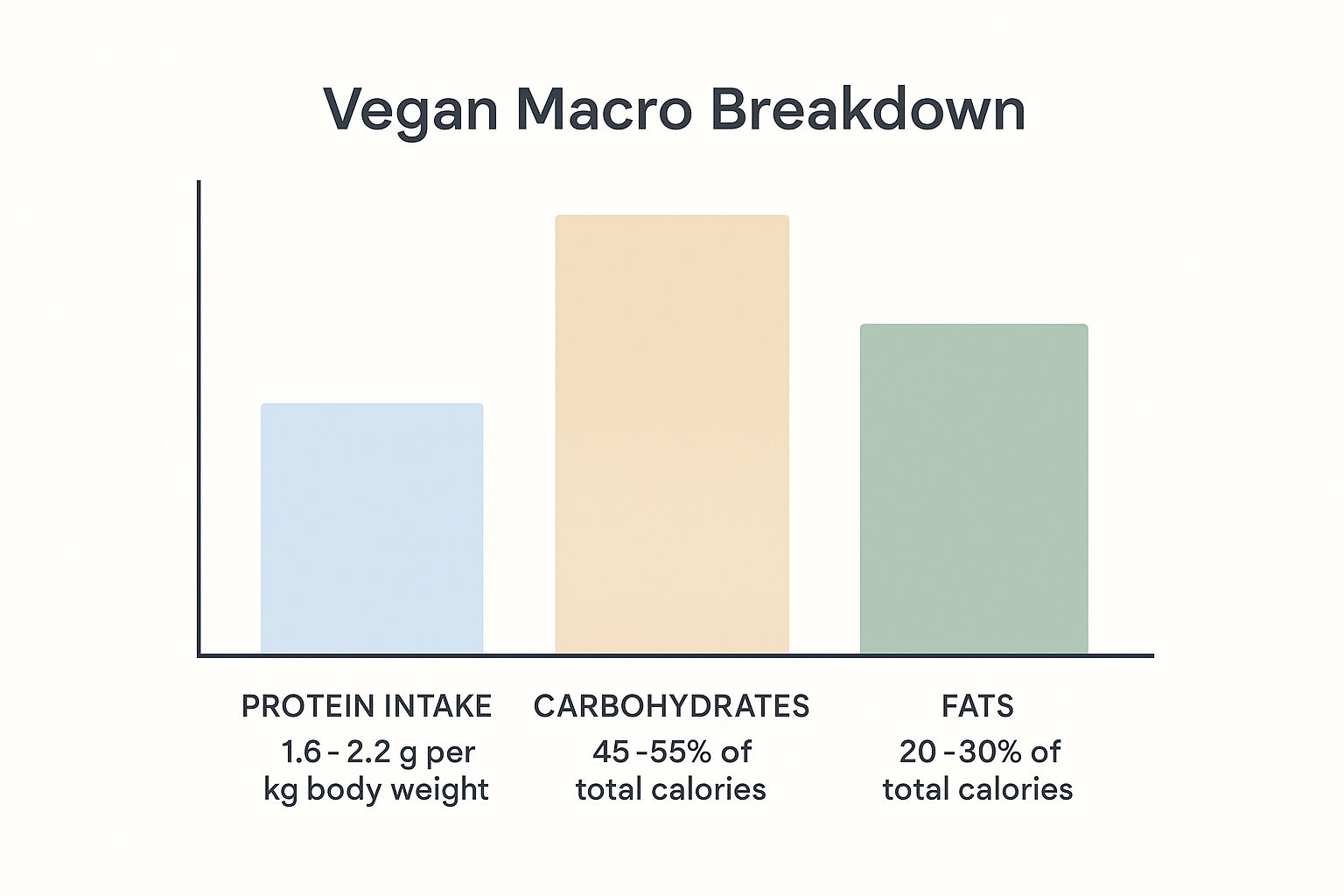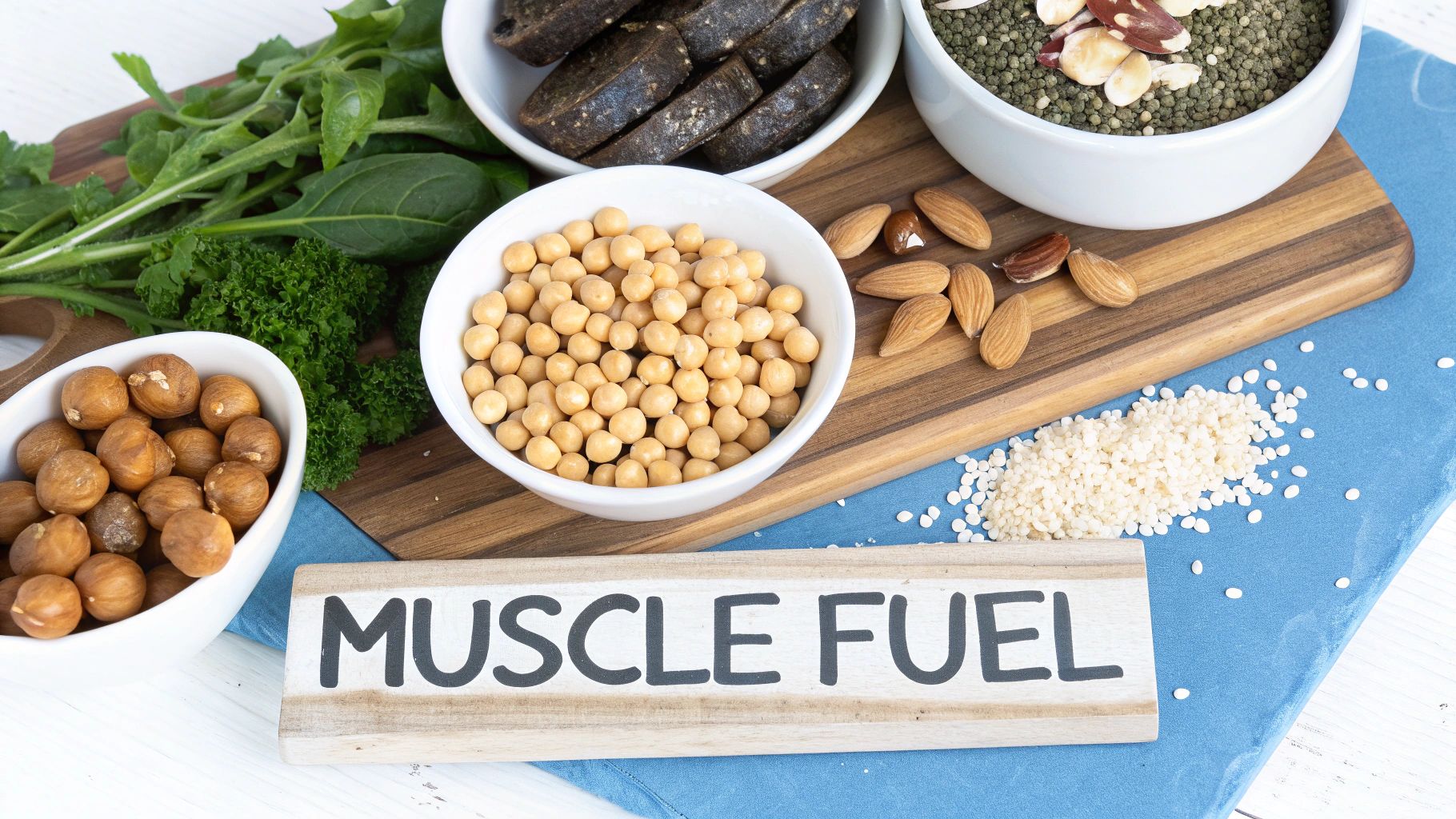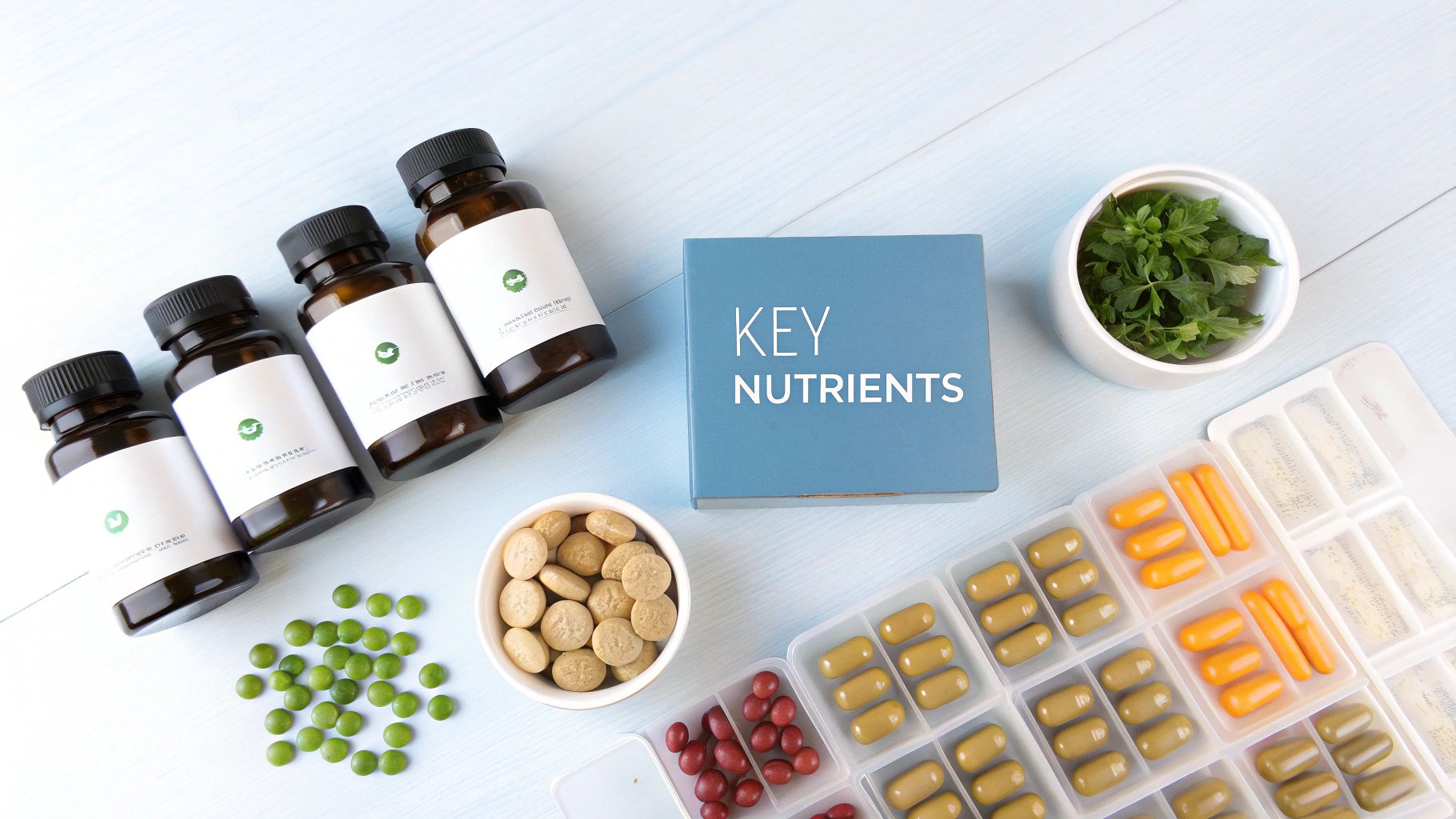Why Plant Protein Actually Builds More Muscle Than You Think

Let's chat about a huge fitness myth: that you need animal products for serious muscle growth. I used to wonder if my tofu scramble could ever match a steak. But after years of vegan bodybuilding, seeing amazing results firsthand, I can tell you plant protein is seriously powerful, just often overlooked.
Think about massive herbivores like gorillas, elephants, and rhinos. They build incredible strength and size on plants alone. And this isn't just anecdotal; there's real science behind it. A 2023 study compared vegan and omnivorous diets for muscle building over a 10-week high-volume resistance training program. The vegan group, powered by mycoprotein, gained 3.1 kg of lean mass, beating the omnivorous group's 2.6 kg gain. This really shows what plant protein can do when combined with the right training. Check out the research here.
Beyond the "Complete Protein" Myth
One big worry people have about vegan bodybuilding is complete proteins. We're told plant proteins lack certain essential amino acids, meaning you have to carefully combine them at every meal. While it's true some plant sources might not have all nine essential amino acids in perfect ratios, they’re definitely not inferior.
The trick is variety. By eating a range of plant-based protein sources like lentils, quinoa, beans, tofu, and hemp seeds throughout the day, you'll naturally get all the amino acids you need. Think of it like a puzzle – each piece contributes to the whole picture. Focusing on your total daily protein is way more important than stressing over individual meal combinations.
The Anti-Inflammatory Advantage
Another perk of plant-based diets is their anti-inflammatory power. Animal products can actually increase inflammation, which can mess with recovery and muscle growth. Plant-based diets, packed with antioxidants and phytonutrients, fight inflammation, creating a better environment for your muscles to grow. This means quicker recovery and potentially bigger gains over time. You might find our complete guide on hemp protein for muscle gain helpful – hemp protein is a great example of an anti-inflammatory plant-based option.
Digestion and Consistency
Finally, let's talk digestion. Plant-based foods, full of fiber, are great for gut health. This might seem unrelated to muscle gain, but a struggling gut loaded with heavy animal products will impact your workouts and recovery. Good digestion means you can consistently fuel your body with what it needs to build muscle, without feeling slow or bloated. This consistency is key for long-term progress. So, forget those outdated myths and embrace the power of plants! You’ll be amazed at what you can achieve with a well-planned vegan diet.
Plant Protein Powerhouses That Actually Deliver Results

This infographic gives you a visual breakdown of the recommended macros for building muscle on a vegan diet: protein, carbs, and fats. Aim for 1.6–2.2 grams of protein per kilogram of body weight. Carbs should be around 45–55% of your total calories, with fats making up the remaining 20–30%. These ranges offer some flexibility, making it easier to find what works best for you while still maximizing muscle growth.
Building muscle as a vegan isn't about living off tofu and bland protein shakes. From my experience, the key is variety, not just for gains, but for enjoying your meals! There's a whole world of plant-based proteins out there beyond the usual suspects.
Beyond the Basics: Exploring Diverse Protein Options
Lentils and beans are great staples, but let's explore some other options. Have you tried hemp hearts? They're a complete protein source with a slightly nutty flavor, perfect sprinkled on salads or blended into smoothies. Another gem is nutritional yeast, which adds a cheesy kick and a surprising amount of protein to pasta or even popcorn.
Combining different plant proteins in one meal can also be a game-changer. This helps create a superior amino acid profile. Think rice and beans – a classic example of two incomplete proteins that, when combined, form a complete protein source.
Maximizing Absorption and Flavor
What you eat is important, but how you prepare it matters too. Soaking beans overnight, for instance, not only makes them easier to digest but also speeds up cooking time. Sprouting grains and seeds can unlock even more of their nutritional potential. These small steps can significantly impact how well your body absorbs and utilizes the protein you consume.
And never underestimate the power of flavor! Bland food is a recipe for diet disaster. Spice up your tofu with delicious marinades, roast your veggies with herbs and spices, and get adventurous with different cuisines. Making your vegan meals delicious will make sticking to your protein targets a joy, not a chore.
To help you navigate the world of plant-based protein, I’ve put together this comparison table:
Complete Vegan Protein Sources Comparison: A comprehensive comparison of top plant-based protein sources showing protein content per serving, amino acid profiles, and bioavailability scores.
| Protein Source | Protein per 100g | Complete Amino Profile | Digestibility Score | Best Uses |
|---|---|---|---|---|
| Tofu | 8g | No | ~90 | Stir-fries, scrambles, smoothies |
| Tempeh | 19g | No | ~75 | Salads, sandwiches, bowls |
| Lentils | 26g | No | ~80 | Soups, stews, salads |
| Chickpeas | 19g | No | ~75 | Hummus, curries, salads |
| Black Beans | 21g | No | ~70 | Burritos, soups, salads |
| Quinoa | 4.5g | Yes | ~92 | Salads, bowls, side dish |
| Hemp Seeds | 31g | Yes | ~90 | Smoothies, yogurt, salads |
| Chia Seeds | 17g | No | ~80 | Puddings, smoothies, oatmeal |
| Brown Rice | 2.6g | No | ~85 | Bowls, stir-fries, salads |
| Nutritional Yeast | 50g | No | ~90 | Sauces, popcorn, soups |
This table offers a quick snapshot of the protein content, amino acid completeness, and digestibility of various vegan protein sources. Remember, combining complementary proteins enhances their overall amino acid profile.
Meal Timing and Practical Prep
Knowing when to eat protein is just as crucial as how much. I like to have a protein shake with Cantein's organic hemp protein powder about 30 minutes before my workout for sustained energy. Afterwards, a lentil-based meal helps me recover. Experiment and find what timing works best for you.
Finally, let’s talk meal prep. I get it – it seems like a lot of work. But even simple things like cooking a large batch of quinoa or roasting a tray of veggies on the weekend can save you tons of time during the week. Pre-portioning snacks like nuts, seeds, and trail mix into reusable containers is another lifesaver. These small steps make a vegan muscle-building diet much more sustainable.
Creating Your Personal Muscle Building Meal Framework

Forget rigid meal plans! We're talking about building a flexible framework that powers your vegan muscle-building journey. This system will fit your life and maximize your gains. Think of it as personalized nutrition, not a cookie-cutter template.
Meal Timing and Muscle Protein Synthesis
Vegan athletes who consistently see results understand the importance of meal timing. Personally, I've found that distributing protein intake throughout the day, roughly every 3-4 hours, really helps keep my muscle protein synthesis optimized. It's not about being a slave to the clock, it's about providing your body with a steady stream of building blocks.
For instance, before a tough workout, I'll whip up a quick smoothie with Cantein's organic hemp protein powder and some fruit for easily digestible carbs. This provides sustained energy without that heavy, sluggish feeling. Post-workout, my go-to is a meal with lentils, rice, and a generous serving of veggies to jumpstart recovery.
Balancing Your Plate for Optimal Recovery
It's not all about protein. Balanced macros are key. A solid starting point is a plate divided roughly into 40% carbohydrates, 30% protein, and 30% healthy fats. Carbs replenish your glycogen, protein repairs muscle tissue, and fats play a vital role in hormone production, which is essential for muscle growth. Remember, this ratio can be tweaked based on your individual needs and how hard you're training.
Want to dive deeper into meal planning? Check out this article: A vegan bodybuilding meal plan to maximize muscle growth.
Eating Enough Without Feeling Overstuffed
One common challenge with vegan muscle building is eating enough calories to support growth. Plant-based foods, while packed with nutrients, can be less calorie-dense than animal products. This is where smart food choices come in.
Instead of forcing yourself to feel constantly full, focus on incorporating calorie-dense vegan options. Nuts, seeds, avocados, dried fruits, and whole grains are your friends. Strategically adding these to your meals and snacks makes hitting your calorie goals much more realistic. Don't forget about liquid calories like smoothies or protein shakes, especially if you're always on the go.
Interestingly, a 2025 meta-analysis comparing plant and animal protein’s effects on muscle found some interesting results. While animal protein had a slight edge in muscle mass gains, particularly in younger individuals, there was no major difference in strength gains. You can find more details here. This really highlights how effective a well-planned vegan diet can be for achieving your goals.
Mastering Meal Prep and Flexibility
Meal prep doesn't have to be a daunting Sunday ritual. Start small. Batch cooking grains, roasting veggies, or prepping overnight oats can save you serious time during the week.
Lastly, be flexible. Life throws curveballs. Missed meals, rescheduled workouts, and sudden cravings happen. It's perfectly normal! This framework is about building lasting habits, not following strict rules. Learning to adjust your nutrition based on your schedule and preferences is crucial for long-term success with a vegan muscle-building diet.
Macro Math That Actually Makes Sense for Plant Gains
Ready to build some serious muscle on a vegan diet? Let's talk about macros. It's not about restrictive, one-size-fits-all formulas. It's about understanding how to fuel your body for growth. I'll break down what's worked for me and other plant-based athletes.
Why Your Protein Needs Might Be Higher
Standard protein recommendations are a good starting point, but for vegan muscle gain, we often need to bump things up. Plant proteins digest differently than animal proteins. Aiming for the higher end – 1.8-2.2 grams of protein per kilogram of body weight – can optimize muscle protein synthesis. Personally, I saw a significant change in my gains once I consistently hit this higher target.
It really made a difference for me.
Carb Timing for Fueling Workouts
Carbs are your muscles' main fuel, particularly during intense training. Timing matters! I've found that a carb-rich meal about 2-3 hours before a workout provides sustained energy without that sluggish feeling. Everyone’s different, so experiment. Don't be afraid to front-load carbs on training days.
Healthy Fats and Hormone Production
Don't forget those healthy fats! Crucial for hormone production, a key player in muscle growth. Avocados, nuts, seeds, and plant-based oils are your friends. Aim for 20-30% of your total calories from fat, prioritizing sources rich in omega-3 fatty acids. These fats not only support hormone balance but also offer anti-inflammatory benefits that can improve recovery.
Flexible Tracking That Enhances, Not Dominates
Macro tracking should be a tool, not a tyrant. It's about understanding your needs, not rigid adherence. There are plenty of apps for vegan macro tracking, but a simple spreadsheet or even a notebook works great. Find a method that fits your life and helps you stay consistent without adding stress.
Adjusting Your Numbers and the Big Picture
Tracking is a process of refinement. Don't be afraid to adjust your macro targets based on your progress. Not seeing the gains you want? A slight increase in protein or overall calories could be the answer. Gaining too much fat? Maybe dial things back a bit. It's all about finding what works for you.
And remember the bigger picture: Consistent training, quality sleep, and stress management are just as crucial as nailing your macros. Numbers are valuable, but they’re only part of the equation.
Eating Intuitively: Listening to Your Body's Signals
Tracking macros teaches you how different foods affect your energy, hunger, and recovery. Over time, you'll start to tune into your body's signals and develop a strong sense of what you need to fuel your goals. This is the heart of intuitive eating. It’s not about guessing; it’s about informed choices based on your own experience.
To help you get started, here’s a handy table:
Vegan Macro Calculation Guidelines: Detailed breakdown of protein, carbohydrate, and fat targets for different training phases and body composition goals.
| Training Phase | Protein (g/kg) | Carbs (g/kg) | Fat (%) | Total Calories | Example Day |
|---|---|---|---|---|---|
| Building Phase | 1.8-2.2 | 3-5 | 20-30 | Calculate based on activity and goals | See Cantein’s sample meal plan |
| Maintenance Phase | 1.6-2.0 | 2-4 | 20-30 | Calculate based on activity and goals | See Cantein’s sample meal plan |
| Cutting Phase | 2.0-2.4 | 1-3 | 15-25 | Calculate based on activity and goals | See Cantein’s sample meal plan |
This table provides a flexible starting point. Remember, these are guidelines, not strict rules. Adapt them based on your individual needs and how your body responds. Learn more about how Cantein's organic hemp protein can support your macro goals.
Smart Supplementation Beyond the Marketing Hype

The supplement industry can feel like a minefield, am I right? Promises galore, products stacked to the ceiling. Let’s cut through the confusion and get real about what truly moves the needle for vegan muscle gain. This isn't about maxing out your credit card, it’s about making informed choices. I'm sharing what's worked for me and other plant-based athletes I've trained with.
The Non-Negotiables: Foundational Supplements
Even if you’re a meal-prepping master, some nutrients can be tough to get enough of on a vegan diet. Vitamin B12 is a classic example. It’s essential for nerve function, red blood cell formation, and energy production—all critical for building muscle. Supplementation is pretty much standard practice for vegans.
Vitamin D is another important one. Sure, some foods are fortified, but sunlight is the major source. Depending on your location and lifestyle, a supplement might be key, particularly in those darker winter months. Vitamin D not only supports bone health, but also immune function and even muscle protein synthesis.
Performance Enhancers: Creatine for Vegan Gains
Creatine isn't just for meat-eaters. This naturally occurring compound, also available as a supplement, helps your muscles produce energy during intense workouts. Think more reps, heavier lifts, and bigger gains. Some people are wary of creatine because of potential water retention, but the strength and power benefits are undeniable, no matter your diet.
Vegan-Specific Considerations: Omega-3s from Algae
Omega-3 fatty acids are important for overall health, impacting everything from brain function to inflammation. Flaxseeds and chia seeds do offer ALA, an omega-3 your body can convert into EPA and DHA (the types found in fish oil), but the conversion rate isn’t always great. Algae-based omega-3 supplements provide EPA and DHA directly, so you get the full benefits without the fishy burps.
Timing, Dosage, and Quality Control
When you take your supplements can matter. For example, creatine absorption is improved when taken post-workout with carbs and protein. Always stick to the recommended dosage on the label and chat with a doctor or registered dietitian if you have any questions. Look for third-party tested supplements to guarantee quality and purity. Brands like Cantein focus on organic ingredients and transparent sourcing, which gives me real peace of mind.
Whole Foods First, Supplements Second
Supplements are meant to supplement a healthy diet, not be the main event. Prioritize whole, plant-based foods for the bulk of your nutrients. Supplements become truly valuable when they fill specific nutritional gaps or boost performance beyond what’s possible through diet alone. This balanced approach, paired with consistent training, is the recipe for sustainable, plant-powered gains. Think of supplements as the cherry on top, not the whole sundae. Learn more about how Cantein’s organic hemp protein can support your overall nutrition. It’s a fantastic way to increase your protein intake while keeping things plant-based.
Training Smart With Plant-Powered Nutrition
Your training doesn't need a complete overhaul just because you're now fueling it with plants. But understanding how a vegan diet affects your body can make a huge difference in your gains. Think of it as working with your new fuel, not against it.
Energy, Recovery, and Training Capacity on a Vegan Diet
Plant-based diets are often higher in fiber, which can change how your body digests food and releases energy. This isn't a bad thing! You'll probably notice more sustained energy throughout the day, rather than quick bursts. This can be a real advantage for endurance and longer workouts.
Recovery might feel a bit different too. Plant-based foods tend to be lower in some nutrients important for muscle repair, like creatine. This doesn't mean you can't recover effectively on a vegan diet. It just means you need to plan your meals strategically for muscle gain. You might be interested in: learning more about how hemp protein can fuel your workouts.
Volume, Intensity, and Recognizing Your Body's Signals
Listen to your body – experienced vegan lifters swear by this. Feeling constantly tired, even with enough sleep? Your training volume could be too high, or maybe your nutrition needs a tweak. Workouts feeling sluggish? Try playing around with the timing of your pre-workout meal. Supplements can also be a great addition; some vegan products offer additional benefits beyond just protein. Check out this guide on vegan beauty products.
Pre and Post-Workout Nutrition for Plant-Based Gains
Fueling your workouts and recovery is crucial, no matter what your diet. But your pre and post-workout meals will probably look a bit different as a vegan. Before hitting the gym, I go for easily digestible carbs like fruit and a source of plant-based protein, such as a Cantein hemp protein shake. This combo gives me sustained energy without that heavy, sluggish feeling you can get from bigger meals. After my workout, I prioritize lentils, quinoa, or tofu with lots of veggies to replenish nutrients.
Timing Your Training Around Digestion
This one's a game-changer. Pay attention to how different plant-based foods affect your digestion. A big bean-based meal right before a heavy lifting session might not be the best idea. Play around with different meal timings and combinations to see what gives you the best energy and digestion. Some vegan athletes love training fasted, while others need a small pre-workout snack.
Warning Signs Your Approach Needs Tweaking
Remember, progress isn't always a straight line. Plateaus happen. The important thing is to recognize when your approach needs an adjustment. Constantly sore for days after every workout? You might be overtraining or not recovering well enough. Not seeing gains in strength or muscle despite putting in the work? Maybe it's time to re-evaluate your macros or training program. Don't be afraid to experiment and fine-tune things as you go. It's a journey, not a race.
Your Complete Plant-Powered Transformation Plan
Alright, let's get down to business and transform all this info into a personalized plan you can start today. Forget a quick summary; think of this as your practical toolkit for long-term, plant-powered muscle growth. We'll talk realistic timelines, what kind of progress to expect, and how to navigate those inevitable roadblocks.
Your First Month: Building Momentum
The first month is all about establishing solid habits. Here’s what to focus on:
- Dial in Your Macros: Remember the "Macro Math" section? Use those guidelines to figure out your starting macro targets. Don't aim for perfection right away, just focus on consistency.
- Master Meal Prep: Start with easy recipes and gradually introduce new plant-based protein sources. Even prepping just a few ingredients ahead of time can make a world of difference. Trust me, I've been there!
- Establish a Training Routine: Shoot for 3-4 workouts per week, focusing on compound movements like squats, deadlifts, bench presses, and overhead presses.
- Track Your Progress: Keep an eye on your weight, measurements, and strength gains. Progress pics are great for visualizing your transformation. It's not about obsessing; it's about gathering useful information.
Your First Quarter: Refining Your Approach
After a month, you'll have a much better understanding of what works for you. Here's what to do in your first quarter:
- Refine Your Macros: Tweak your protein, carbs, and fats based on your progress and how you're feeling. Don’t be afraid to experiment a little – your body will tell you what it needs!
- Expand Your Culinary Skills: Explore new vegan recipes and branch out with your protein sources. Variety is key, both for your gains and to keep things interesting in the kitchen.
- Progress Your Training: Start gradually increasing the weight, reps, or sets. Push yourself a bit further each week, but always listen to your body.
- Assess and Adjust: Look over those progress photos, check your measurements, and even notice how your clothes are fitting. Use this info to refine your approach and keep moving forward.
Maintaining Momentum and Adapting to Change
Long-term success is all about adapting and staying flexible. Here’s how to keep the momentum going:
- Listen to Your Body: Pay attention to hunger cues, energy levels, and how well you’re recovering. Your body is your best feedback mechanism!
- Embrace Flexibility: Life gets in the way sometimes. Don't beat yourself up over a missed workout or a less-than-perfect meal. Just get back on track as soon as you can.
- Continuously Learn: The fitness world is always evolving, so keep up with the latest research and training methods for plant-based muscle building.
- Celebrate Your Wins: Acknowledge your hard work and celebrate those milestones. It’s a journey, so enjoy the process!
Troubleshooting Common Challenges
Everyone faces challenges. Here’s how to handle some common ones:
- Plateaus: If your progress stalls, don’t panic. Take a look at your macros, training, and recovery routine. Sometimes a small tweak is all you need.
- Lack of Motivation: Find a workout buddy for extra accountability or join a vegan fitness community online. Connecting with others can be super helpful. And remember your “why” – why did you start this in the first place?
- Time Constraints: Prioritize efficient workouts and quick, easy meal prep. Even small, consistent actions add up over time.
This plan is your personal blueprint for reaching your plant-powered muscle-building goals. Consistency and patience are the keys here. Now, let's do this! Fuel your plant-powered gains with Cantein's organic hemp protein.

